Winner, 2022 International Book Awards – Contemporary Poetry
In a world barely beginning to recognize itself as dazzlingly multihued, the erupting ecocide is teaching that while no accounting of complexity is complete, change is true and the sky, singular.
We are of parts fundamentally interconnected and overlapping.
If we choose it, this overlapping can become a continuum. A continuum of movement combined with still-ness, individuality reaching for the whole, loss and surrender, abandon and opening.
And of falling: an ever-falling, toward the intensive care that is love.
“Valiani’s words vibrate with a keen awareness of love as a force of rupture/rapture/way of navigating through the crises of capitalism/climate and the multiform/ever-present nature of colonial “pasts,” should love be what leads the way as we embark on journeys across the globe that are continually “rebeginning.” 29 leads to love is a book that is part radical map, part kinetic geography of the body, but also “part there / part here / part beyond.”
—Adebe DeRango-Adem, author of Terra Incognita
“Salimah Valiani’s 29 leads to love is an paean to love that is political, transformative and global. Her words–precise, evocative and justice-seeking–take us to streets of New Delhi, Mexico, Johannesburg, and Manila, showing and teaching us that love is more than what we can imagine.”
—Farzana Doctor, author of SEVEN
powered by Crowdcast
Salimah Valiani is a poet, activist and researcher. She has published six collections of poetry: breathing for breadth (TSAR), Letter Out: Letter In (Inanna Publications), land of the sky (Inanna Publications), Cradles (Daraja Press), and 29 leads to love (Inanna Publications). Her audiobook, Love Pandemic is forthcoming from Daraja Press. She has also published one research monograph, Rethinking Unequal Exchange – The Global Integration of Nursing Labour Markets (University of Toronto Press), and one edited volume, The Future of Mining in South Africa (Mapungubwe Institute for Strategic Reflection). She has lived and worked around the world, with extended stops in Montreal, London, New York City, Binghamton, Toronto, Cape Town, Ottawa and Johannesburg. Throughout, poetry, lands, greenery and water have been vehicles of reflection, observation and spiritual calm. Her poetry has been featured in All Lit Up, the online book forum of The Literary Group of Canada, and has received an Honourable Mention in the Lena Wilson Endicott Poetry Contest of Our Times Magazine. In June 2012 she was awarded the Feminist Economics Rhonda Williams Prize for her research and advocacy work. Her poem-story, Dear South Africa, was selected as one of 7 chapbooks of Praxis Magazine’s 2019-2020 Chapbook Series. Check out her work online at: https://www.facebook.com/SalimahValianiPoet.
body map
part there
part here
part beyond
this longitude struggle
this longitude strife
this latitude song
joint between here and song
cartilage joining there beyond
organ a function of struggle here there beyond
limbs traveling
struggle strife song
here there beyond
body a cartography traversing and transgressing frontiers
For Iraq, March 2003
somewhere love
but here
15 tots
noosed by the sashes
of 15 stained bonnets
sashes with xerographic transfers
of archival papers
collaboration
lost in the crack
in between two sets
of contrasting train tracks
cold weight
of snowflakes
multihued
like an oil spill
christening gown for trees
suspended
over a grove of five young poplar trees
planted in cement
15 hand stitched doll garments
of an unknown child
somewhere love
but here
an attack
called war
and slipping hegemony
mistaken for omnipotence
On the immaterial
she said I can count on two
fingers
the times I’ve been lifted
he said
I don’t remember
the number of times
I’ve been lifted
as a baby
small child
when ill
but I know when I have felt held
skin to skin
tear drop to tear drop
today in Kenya,
the streets of Mexico
South Korea
people are holding together
because they feel unheld
I can count on two fingers
the times I’ve been lifted
but today
with my two fingers and
entire being
I can and will
hold

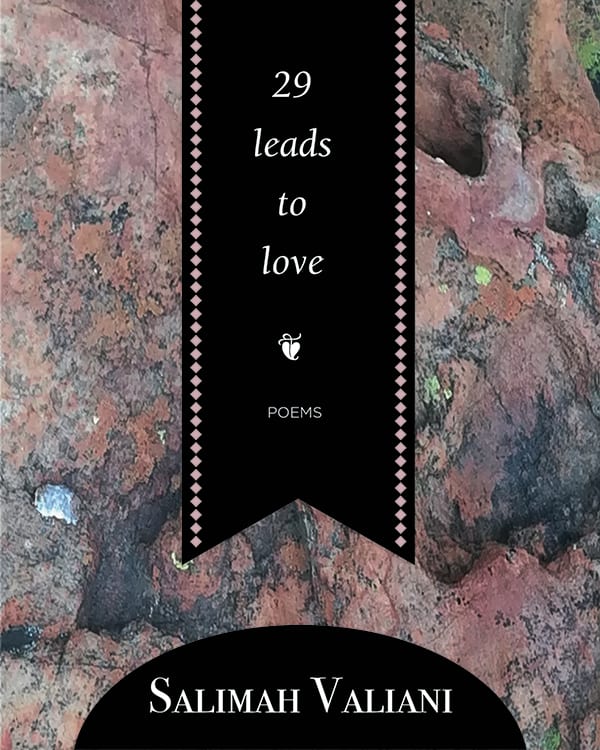

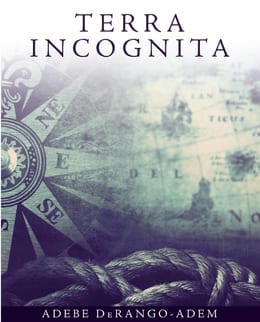
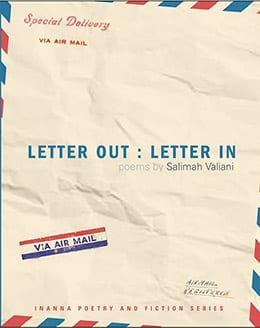
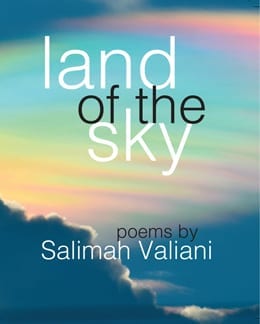
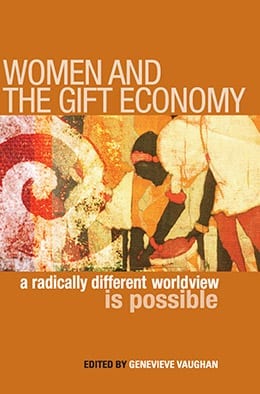
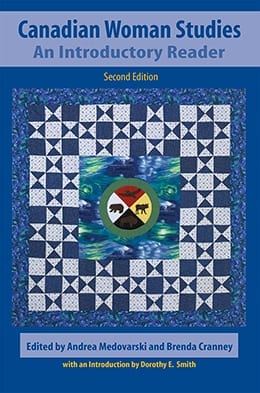
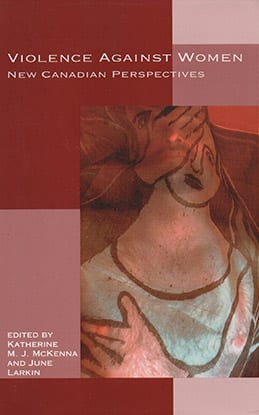
Inanna Admin –
Love is a Transformative Power in Salimah Valiani’s New Poetry Collection 29 Leads to Love
reviewed by Alesia Alexander
brittle paper – September 6, 2021
https://brittlepaper.com/2021/09/love-is-a-transformative-power-in-salimah-valianis-new-poetry-collection-29-leads-to-love/
Salimah Valiani has a new collection of poetry titled 29 leads to love. The collection was published by Inanna Publications on June 24, 2021. It explores Valiani’s view of love across cities, landscapes, environments, and time.
While love is the organizing theme of the collection, the book also looks at history, movement, migration, loss, and healing. Some of the poems describe places, people, and architecture across historical moments. In the poem titled “Mexico City or, On love (vii),” magnificent historical buildings and features of Mexico are contrasted with glimpses of present everyday life and struggles in a stunning play of imagery.
Readers interested in lyrical descriptions of various places and how love can change and heal our world will enjoy this collection. Farzana Doctor, author of SEVEN, praises Valiani’s work as “an paean to love that is political, transformative and global. Her words–precise, evocative and justice-seeking–take us to streets of New Delhi, Mexico, Johannesburg, and Manila, showing and teaching us that love is more than what we can imagine.” In another celebration of the collection, CBC News describes Valiani’s goal aiming to “define this larger love, avoiding the more pervasive love poems that focus on romance and individual healing, and ultimately proffering that love is the means to transformative change in the twenty-first century.” The collection speaks to Valiani’s experiences, which sit at the intersection of various cultural influences. Her mother is from Uganda and her father is from Tanzania. Also, she has lived in many cities around the world for extended periods of time.
Read the publishers description below.
In a world barely beginning to recognize itself as dazzlingly multihued, the erupting ecocide is teaching that while no accounting of complexity is complete, change is true and the sky, singular. We are of parts fundamentally interconnected and overlapping.If we choose it, this overlapping can become a continuum. A continuum of movement combined with still-ness, individuality reaching for the whole, loss and surrender, abandon and opening. And of falling: an ever-falling, toward the intensive care that is love.
Inanna Admin –
29 leads to love by Salimah Valiani
reviewed by Stephen Derwent Partington
AwaaZ Magazine Vol 19, No 2 – September 7, 2022
https://www.awaazmagazine.com/volume-19/issue-2-volume-19/book-reviews-issue-2-volume-19/29-leads-to-love
‘Love as an Act; Justice as a Possibility’
Recently, a social media Friend posted what, from her tone, was a rhetorical question: ‘Do people still make love these days?’ There was collective exasperation in the ensuing thread, perhaps born of the Tinder-tendency of modern relationships to glibly Swipe Left when you intend to dismiss a fellow human, and to Swipe Right for a get-together.
I’m not judging those who consensually choose the fleeting ‘relationship’, and never will; I’m simply asking whether there might still, also, be a role for more enduring and liberating forms of Love, Compassion, and Altruism.
A recent book of new and selected poems, Salimah Valiani’s 29 leads to love, provides hope for those who believe that the concept of Love, however understood, shouldn’t be retired. The well-deserved winner of the Contemporary Poetry category of 2022’s International Book Awards, Valiani’s free-verse collection offers the reader a series of twenty-nine poems, each entitled ‘on love’, which constitute twenty-nine pathways towards a better world.
Fifteen other poems are interspersed across the collection, and these deal with many of the injustices of modern living, from the vile racism of Apartheid, to oil pollution, to the privatization of essential public resources, to South African diamond mining, to ecocide… But Valiani is not content to fight vague abstractions. Rather, her own professional rootedness in the specialist field of Political Economy enables her to identify the material causes of injustice, and she is armed with figures; in one poem on the exploitation of the global poor, we learn that ‘50% of the children under 4 are malnourished’. This sporadic quoting from formal reports suggests a poet who, despite the occasional mysticism of her verse, is acutely aware of how the world’s inequality stems from that economic system, capitalism.
It is clear from Valiani’s verse that where Love is absent, you’ll find the cruelties of capitalism, which is implicitly associated with love’s nemesis, exploitative Hatred. In one poem, ‘For the Eastern Ghats’, Valiani contrasts the potentially unspoiled beauty of India’s Ghats with Britain’s colonial imposition of hut tax on a society that until then celebrated the shared abundance of sustainable resources. But she’s not content to think that the formal end of colonialism solved matters, and instead proceeds to criticise postcolonial India’s continuingly destructive practices; for example, extractive tourism, bio-prospecting and mining in today’s Ghats.
These few poems on the wrongs of global capitalism travel the world, like Valiani herself has. Her work as a free-spirited academic and poet has taken her from South Africa to Canada to our East Africa, where her parents were born, and her migratory poems range even further, featuring every continent, tracing similarities between them: similarities of suffering, but also of love, the love that, her poems imply, can pull us away from injustice and towards a more hopeful, compassionate future where love might always triumph. It is encouraging that she has about twice as many poems featuring routes out of oppression than she has poems about oppression.
And this is what Valiani’s fine collection offers us: routes out of suffering, and hand-holding leads into love. In the first of her love poems, she classically suggests that love is something ‘none can name’, and therefore she instead offers us twenty-nine specific manifestations or examples of love. The random number of twenty-nine suggests that there could be more, perhaps even infinite, types and expressions of love.
In 29 leads to love, love is always an act, is always interpersonal, and the small act of love is never insignificant, but eventually reaches all of society in time. In one short poem, ‘on love (xiii)’, a Sufi singer accepts a bouquet of flowers from an audience member, passes these along the line of performers who take one each, and ‘then the singer/ gifts the bouquet/ to the listeners.’ Valiani’s Love is always a gift exchanged between people, and this as an emancipatory currency that contrasts with the grubby financial exchanges of capitalism.
Perhaps the mention of Sufism in ‘on love (xiii)’ reminds us of Rumi’s famous saying, that ‘Wherever you are, and whatever you do, be in love’. Indeed, this seems to be the underlying message of 29 leads to love, that if we continue to love, to give the gift of it and willingly receive it, then we’ll find routes out of injustice, and that love will grow exponentially from locality to locality, across the Earth. And isn’t this another aspect of Sufistic Love, the idea that the secular manner in which we love one another as individuals has the eventual consequence of enabling us to be loved by and love God? At the very least, Valiani’s poetry reminds us that if we love the one we’re with, as the old song lyric goes, we’ll eventually end up with a global economy of love from which all society will benefit.
But perhaps the most exciting aspect of 29 leads to love is the manner in which, like all transformative poetry, it articulates similarities between ostensibly dissimilar things, and how by doing so it prods the reader to imagine alternatives to suffering. These shocks include the simple reminder that although in terms of decontextualized Form ‘a table is a table is a table’, the same table, when contextualized within the group act of eating, ‘is a gathering space’, a place of community. They further include the synaesthesia of ‘painters depicting music for the deaf’, lovingly. But they also include the final poem’s proposals for a better world, where we encounter ‘police officers practicing yoga to keep the peace’ and where ‘the only burning [is] candles and sun’. The collection then ends with the three dots of ellipsis, which function as a generous invitation to the reader to ourselves go out and perform a 30th act of love, then another…
Presently, such hopes seem like pipe dreams, and this final poem feels surrealistic as a result, but its message inspires: Just Imagine! In such a world, Tinder wouldn’t be Love’s terminus. Peaceful, joyful community would. Justice would.
Inanna Admin –
29 leads to love by Salimah Valiani
reviewed by Pearl Pirie
The Miramichi Reader – September 21, 2021 (Excerpts)
https://miramichireader.ca/2022/09/29-leads-to-love-by-salimah-valliani/
…Some poets work at the level of image and metaphor, some at sound & fragment, some in narrative, others in concept. Valliani works at the concept of love to connect every distinct culture and person on earth.
Salimah Valiani’s 29 Leads to Love expands on and extends the focus of her 2009 collection, Letter Out: Letter In, with the Sufi notion of love as a kind of attention which unifies. What does this underlying structure express?
Love can be the excitement of kaleidoscopic sunlit senses of Mexico City (p. 21-23) or the dwelling in non-time of meditating on a table (p. 24-25). Love is not a simple unnuanced thing. Love is asserting the need to change our ways “to do it differently” p. 29-35) and care for one another, the most vulnerable ones among us, whether children in danger, seas being overharvested, or isolated migrants. she “meets with what she wants to do//and she is doing it”. Love is caring about and listening to the people inside a litany of war massacres. Love is hearing stories, and this collection has many…
When ALU asked, How would you describe your poetry collection? [Valiani] aptly answered, “Three words: loss, love, opening.”
The collection takes a journey and invites us as passengers.
Inanna Admin –
29 leads to love by Salimah Valiani
reviewed by Irene Marques
The Humber Review, vol 10, issue 2 – January 22, 2023
https://humberliteraryreview.com/reviews-1/2022/1/17/reviews-vol-10-issue-2
Salimah Valiani’s 29 leads to love is characterized by dazzling and graceful imagery that reaches the reader on a multitude of levels, awakening our intelligences to make us see the many dimensions of the realties the poet exposes. The collection explores the concept of love in a heterogeneous, powerful, and moving manner, calling our attention to collective well-being and the future of our planet. The exploitation of the physical world and humans by humans constitutes the principal preoccupation of the book and is presented as the impediment to an existence of maturity and realization. The collection asks us to build new social systems based on revised epistemological paradigms that will pave the way to a more realized, advanced world and personhood. As the title implies, the poems lead (guide) us to alternative ways of seeing, understanding, and doing, demanding that we extend our beingness. This change, this extended beingness, is love.
To love is to strive to know more because when we know more, we do better. As Valiani explained to me in an email exchange in June of 2022, “The poems are a non-intellectual way to encourage thinking and feeling about relationality, where everyone plays a part, and being deliberate about how we enact the part.”
Respect for the “non-human other” or for one’s physical body is at the forefront of the book’s ethos and is intrinsically tied to the idea of love that runs through the collection. The physical, in its diverse manifestations (the river, the plants, the sky, the rocks, the city, the very human body) is presented as the sacred house we inhabit and a source of great knowledge, wisdom, joy, and affiliation with the “other.” It is the medium that permits us to attain spiritual enlightenment and see the connections between self and other—other human and other non-human. We learn through the body, through the senses, realizing how we are like other bodies.
To love is to “hold,” a verb used often throughout the collection, implying that one must care for an “other” who needs our attention, our help, our embrace—an “other” who is part of us. This “holding” entails touching, physicality, materiality, pointing again to the importance of the body-material throughout the collection. This body-material also entails the creation of healthy social institutions, a new politics of living that can—if built intelligently, with compassion and the well-being of the collectivity in mind—“hold (take care of) us,” rather than destroy, exploit us. We hold one another and the world by designing thoughtful, inclusive institutions and non-predatory economic and social systems. Without the force of the us working together to remake our world, there is no healthy collectivity possible. This is love.
The final poem of the collection, “To do it differently (ii) or, On love (xxix),” picks up on these ideas about what we must do differently to regenerate our world. This poem begins with a statement from a woman of Abya Yala, a region in the Darién Gap whose name means “land in its full maturity” or “land of vital blood” in the Guna Indigenous language: “We don’t know how to die. When we learn to die, we will learn to live and our war will end.” The statement emphasizes that it is necessary to kill old ways of living and learn new ways of building a more egalitarian world. Valiani explains that in this poem she attempts to “imagine and magnify a feminist ethic of care to a world scale, going far beyond women or caregivers or those in need of care.” This is love.
To love is also to give without expecting anything in return. And pain and suffering are displayed as the road to greater love, because when our own heart is broken, there is enough of it to go around—to do good to others, that is, so that their suffering can be minimized—as the poem “On love (xi)” poignantly reminds us:
how many times can your heart be broken
once
after that
the pieces
are enough
to go around (p. 43)
This is love in action (going around). Let’s love then, in all the endless ways required of all of us, so that we can inhabit the Abya Yala—“a land in its full maturity, a land of vital blood,” the one Great Love produced out of all our love. Our beingness demands it.
Inanna Admin –
29 leads to love by Salimah Valiani
reviewed by Amelia Eqbal
Arc Poetry – June 2, 2023
https://arcpoetry.ca/editorials/29-leads-to-love-salimah-valianis/
It is primarily concerned with ecocide, which is defined by Oxford Languages as “the destruction of the natural environment by deliberate or negligent human action.” This focus is evident in the poet’s many meditations on the state of the environment and her connection to nature.
There are moments of beauty and calm that demonstrate a deep respect for the subject matter, such as in “On love (ii)” where Valiani writes, “the leaves were / to cheek / what wind was / to leaves.” Here, she writes of a soft caress from an innocuous moment communing with nature, or a “piece of peace / amid hectic city heaving” as she so aptly puts it. Similarly, in “On love (vi)” she describes “diamonds of sunlight touching water,” reverently capturing that magical, glittery quality of a setting sun across a lake or an ocean.
The collection is also concerned with our contemporary definition of love, challenging how narrow it can be. The 29 leads to love in question ponder all the different forms, facets and types of love that can exist in our world—whether it’s love for one’s community or heritage, or a love for honoring history accurately and for uplifting grassroots activists. Valiani writes of love found, love lost, love soured and rediscovered.
There is also a level of self-awareness that permeates the text. For instance, in “Conserve a Exposição,” the spacing between words and stanzas varies, drawing out the short lines and giving the poem a sense of movement across the page. What’s more, there is a line in the middle of the page that reads, “sculpture distanced from imperiousness.” This line feels particularly striking because of the so-called sculpted distance between words and letters within the very poem.
The poet references moments across space and time, bringing the reader everywhere from 1780s Mexico City, to the northern cape of South Africa, to a protest in Toronto. In some instances, she employs linguistic and cultural references without any further explanation, giving much credit to the reader and indeed encouraging them to take responsibility to engage with the text fully. In other poems, she invites the reader into the world she’s describing, using footnotes in poems like “Mexico City or, On love (vii),” to offer immediate context clues and enough explanation to appreciate the text at first read.
Indeed, the text is steeped with an understanding of history, and an implicit desire for others to think critically about the events that have led to the systems within which we operate today. For example, in “For the Eastern Ghats” she writes: “two houses or more make a village, the British said / to impose tax.” The way these lines are written is particularly heartbreaking because in that space between finishing the first line and reading the second one, at first one might think the poem is talking about finding strength in community amidst colonial oppression; but, the short stark punch of the following line about the ensuing taxation of this colonial arrangement emphasizes how so much of this world has been constructed to benefit the wealthy few.
Salimah Valiani’s 29 leads to love is rife with both abstract musings and specific callbacks, broadly reflecting on the ways we record and remember our relationships to culture, history, and the natural world.